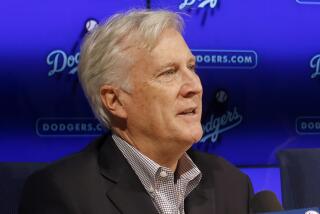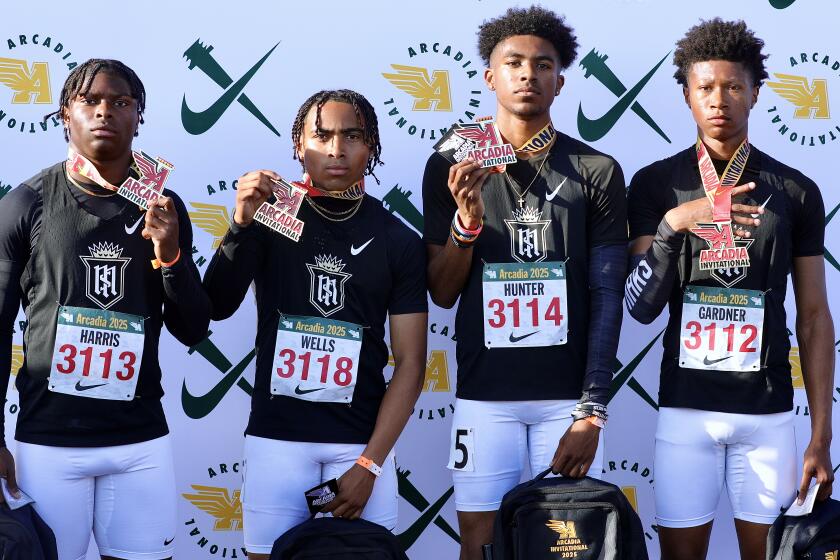Olsen Believes That Owners’ Win Could Become a Loss in Long Run
- Share via
Merlin Olsen believes that if the National Football League owners have indeed killed the players’ union, they have left themselves a larger problem than where to send the flowers.
Olsen, who was the Rams’ player representative in the early 1970s, suggested, “The owners have built a trap for themselves.”
Olsen, a former defensive tackle who retired after the 1976 season and was inducted into the Pro Football Hall of Fame in ‘82, related his scenario by phone from the Central California coast, where he was filming a television show.
His view is that a combination of the owners’ arrogance and the players’ disenchantment with their own union could lead to the last thing the owners want: free agency.
Without a union, Olsen reasoned, players could easily win their own freedom in court, as they did previously, before their former executive director, Ed Garvey, bargained it away in negotiations in 1977.
In exchange, Garvey got the owners to institute the dues checkoff system, which guaranteed the union dues from members through payroll deductions.
The owners said at the end of the strike, however, that they will no longer collect dues for the union.
“Now, the players’ association is really on shaky ground,” Olsen said. “In essence, they probably took about half of the operating revenue right out of the pocket of the union.
“Having had to collect those checks myself, I can guess that when guys who have just sacrificed 60 or 80 thousand (dollars) are hit up for this (annual dues of) $2,400, a lot of ‘em are just going to say, ‘Take a hike.’
“The only appeal is to say to that player, ‘Look what we’ve done for you or what we’re going to do for you.’
“But now you’re going to have guys that are so angry at what they consider to be the failure of the NFLPA that there’s no way they’ll reach for the checkbook. In most cases you’re going to get very cold stares.”
Furthermore, Olsen said, there is little advantage now for a player to join the union.
“There’s no way to deny an individual the benefits of that collective bargaining agreement if he does not pay his dues,” he said.
Doug Allen, assistant executive director of the NFLPA, said the collection of dues was scheduled to start next week. He anticipated no problems.
“The players responsible for collecting the dues are guys the players elected to represent them,” Allen said by phone from Miami Beach, where he was attending the AFL-CIO convention.
Besides, Allen said, dues collection was voluntary, as Olsen described it, until 1977, and “We survived that before.” After ‘77, it was still voluntary for teams in Texas, Georgia, Florida and Colorado, where laws don’t allow for a checkoff system.
“And we’ve done very well in those places,” Allen said.
But the mood of the rank and file may be different now.
“One of the things you learn as an athlete is that you never want to embarrass an opponent or beat an opponent too badly that you’re going to have to come back and face later on,” Olsen said.
“The owners may have won this thing too big because they really crushed the union--and not only crushed them in terms of defeat but then gave then one more good kick when they were down and wouldn’t allow them to play the next game. I don’t think the players will forget that.
“I also see a very strong movement from the rank and file to oust (Executive Director Gene) Upshaw and the leadership of the union. They’re angry at the way this thing was handled.”
Allen said: “We serve at the pleasure of the player reps. The only way the players will lose this struggle is to give up on the idea of the union itself.
“We’ve been through some difficult times before. There may be some anger and frustration but the problem is with the ownership--people like Tex Schramm, Joe Robbie and Hugh Culverhouse. The hard-liners among the owners are the reason we’re having problems.”
Management Council spokesman John Jones said from New York, “It is convenient to say it is something that management did to destroy the union, which I don’t believe, because the union leadership was doing such a good job on their own.
“(Management) recessed negotiations Oct. 11. At that time on the table were not only offers that would have continued dues check-off as part of the next agreement (but also) the largest single pension offer in the history of the union.”
Olsen said even if the union doesn’t collapse financially, it could lose its legal standing if the membership falls below 50% representation.
“All the players that came in as part of the replacement teams were told that they had to sign a letter which basically was a resignation from the NFLPA,” Olsen said. “That’s about 10%” (Actually, 261 of the 1,585 defected, or 16.5%.)
“What happens if another 40% resign from the NFLPA?” Olsen asked. “At that point the NFLPA ceases to exist as a bargaining unit for the NFL players. Any contract signed by the NFLPA is invalid. That invalidates the draft (and) the free agency (compensation) system.”
Another sore point was the deadline set several days before the strike ended--Wednesday, Oct. 14, at 10 a.m. PDT--for players to return and be eligible to play and be paid for the next game. Players who didn’t come in until the strike ended on Oct. 15 were furious at being offered only training camp wages of $700 for veterans and $450 for rookies that week.
“There were some owners who smelled blood,” Olsen said.
But the Management Council’s Jones said, “The owners were consistent in announcing a reporting deadline. This was a business-justified deadline based on coaching preparation and the physical time (required to) get people ready to play again.
“The players could have come back to work on Wednesday just as easily as on Thursday. The players were misadvised by the union that they could come back on Thursday and Friday and still get paid.”
The union filed suit in federal court on free agency at the end of the strike, but Olsen said: “I see that court action as a lame duck. No matter what happens--and it’s going to be a long time coming--it will be appealed, and the appeal will be appealed. I think they’re going to look for other ways of getting something to happen.”
One way to speed up the process, Olsen suggested, would be for the union to commit suicide.
“The players’ association staff itself has looked at the possibility of abandoning the NFLPA,” Olsen said. “I can’t give you the source for that, but it’s people at the headquarters.
“The owners probably would have to put together a sweetheart union which would offer the players a better package than they have today.
“I just have a feeling that maybe the owners didn’t think this thing all the way to its conclusion. They want a weak union. They did not want to kill the union. And I just feel they’ve gone a step too far. I see some real changes coming and maybe even a death rattle from the NFLPA.”
More to Read
Go beyond the scoreboard
Get the latest on L.A.'s teams in the daily Sports Report newsletter.
You may occasionally receive promotional content from the Los Angeles Times.










